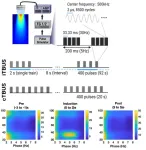(Press-News.org) Researchers have shown that the drug benralizumab is as effective and safe as mepolizumab for inducing remission in patients with eosinophilic granulomatosis with polyangiitis (EGPA) according to a study published today in The New England Journal of Medicine. The results of the non-inferiority study were presented at the American Academy of Allergy, Asthma & Immunology annual meeting in Washington, D.C., by Michael Wechsler, M.D., pulmonologist, director of The Cohen Family Asthma Institute at National Jewish Health and lead author of the paper.
EGPA is a rare form of vasculitis, characterized by inflammation in the small blood vessels. This inflammation causes restriction of blood flow, which can cause organ damage if left untreated. The cause of the disease is unknown, and it affects people differently depending on which organs are impacted. It is estimated that 50,000 individuals suffer from EGPA.
Oral glucocorticoids and medications that suppress the immune system have been the standard treatment for EGPA, but they can come with damaging side effects. Targeting inflammation caused by eosinophils (a type of white blood cell) is another well-recognized treatment for EGPA, and mepolizumab became the first FDA-approved treatment for EGPA in 2017. Benralizumab is currently approved for the treatment of severe eosinophilic asthma, suggesting it might also be a treatment for EGPA.
“By showing that benralizumab has comparable results to mepolizumab in the safe treatment of EGPA, we have added another potential option in the arsenal to help patients of this rare disease,” said Dr. Wechsler. “While both drugs showed similar disease remission, relapse and safety impacts, we observed benralizumab did a better job in reducing the need of oral glucocorticoids and lower blood eosinophil counts. This was achieved using fewer injections of benralizumab, which also could be a benefit to the patient.”
The study randomized 140 patients who received either one 30 mg injection of benralizumab or three 100 mg injections of mepolizumab every four weeks for 52 weeks. The primary analysis was to evaluate the non-inferiority of benralizumab versus mepolizumab. The results suggest that targeting eosinophils as a therapeutic strategy in EGPA can lead to a higher number of patients achieving remission, and a lower number experiencing relapse. Achieving these results while seeing substantial reductions in oral glucocorticoids use provides further evidence of the role of eosinophils in EGPA.
“Though further studies are needed, our results indicate that eliminating oral glucocorticoids may now be an achievable treatment goal while using eosinophil-targeted drugs for EGPA,” said Dr. Wechsler.
This study was sponsored and funded by AstraZeneca.
National Jewish Health is the leading respiratory hospital in the nation. Founded 125 years ago as a nonprofit hospital, National Jewish Health today is the only facility in the world dedicated exclusively to groundbreaking medical research and treatment of children and adults with respiratory, cardiac, immune and related disorders. Patients and families come to National Jewish Health from around the world to receive cutting-edge, comprehensive, coordinated care. To learn more, visit the media resources page.
Researchers have shown that the drug benralizumab is as effective and safe as mepolizumab for inducing remission in patients with eosinophilic granulomatosis with polyangiitis (EGPA) according to a study published today in The New England Journal of Medicine. The results of the non-inferiority study were presented at the American Academy of Allergy, Asthma & Immunology annual meeting in Washington, D.C., by Michael Wechsler, MD, pulmonologist, director of The Cohen Family Asthma Institute at National Jewish Health and lead author of the paper.
EGPA is a rare form of vasculitis, characterized by inflammation in the small blood vessels. This inflammation causes restriction of blood flow, which can cause organ damage if left untreated. The cause of the disease is unknown, and it affects people differently depending on which organs are impacted. It is estimated that 50,000 individuals suffer from EGPA.
Oral glucocorticoids and medications that suppress the immune system have been the standard treatment for EGPA, but they can come with damaging side effects. Targeting inflammation caused by eosinophils (a type of white blood cell) is another well-recognized treatment for EGPA, and mepolizumab became the first FDA-approved treatment for EGPA in 2017. Benralizumab is currently approved for the treatment of severe eosinophilic asthma, suggesting it might also be a treatment for EGPA.
“By showing that benralizumab has comparable results to mepolizumab in the safe treatment of EGPA, we have added another potential option in the arsenal to help patients of this rare disease,” said Dr. Wechsler. “While both drugs showed similar disease remission, relapse and safety impacts, we observed benralizumab did a better job in reducing the need of oral glucocorticoids and lower blood eosinophil counts. This was achieved using fewer injections of benralizumab, which also could be a benefit to the patient.”
The study randomized 140 patients who received either one 30 mg injection of benralizumab or three 100 mg injections of mepolizumab every four weeks for 52 weeks. The primary analysis was to evaluate the non-inferiority of benralizumab versus mepolizumab. The results suggest that targeting eosinophils as a therapeutic strategy in EGPA can lead to a higher number of patients achieving remission, and a lower number experiencing relapse. Achieving these results while seeing substantial reductions in oral glucocorticoids use provides further evidence of the role of eosinophils in EGPA.
“Though further studies are needed, our results indicate that eliminating oral glucocorticoids may now be an achievable treatment goal while using eosinophil-targeted drugs for EGPA,” said Dr. Wechsler.
This study was sponsored and funded by AstraZeneca.
National Jewish Health is the leading respiratory hospital in the nation. Founded 125 years ago as a nonprofit hospital, National Jewish Health today is the only facility in the world dedicated exclusively to groundbreaking medical research and treatment of children and adults with respiratory, cardiac, immune and related disorders. Patients and families come to National Jewish Health from around the world to receive cutting-edge, comprehensive, coordinated care. To learn more, visit the media resources page.
END
Study shows benralizumab is effective as a treatment for eosinophilic granulomatosis with polyangiitis, a rare form of vasculitis
2024-02-23
ELSE PRESS RELEASES FROM THIS DATE:
Researchers identify new choice of therapy for rare autoimmune disease EGPA
2024-02-23
An international team, including researchers from McMaster University and St. Joseph’s Healthcare Hamilton, has identified a new therapeutic for patients with a rare autoimmune disease called eosinophilic granulomatosis with polyangiitis (EGPA). A biologic drug called benralizumab has been shown to be non-inferior to mepolizumab in the treatment of EGPA.
In a clinical trial involving 140 patients with the rare disease, researchers directly compared two biologic drugs, mepolizumab and benralizumab. Patients received monthly subcutaneous injections of either 300 mg of mepolizumab or 30 mg of benralizumab for one year. The findings of the trial were published on Feb. 23, 2024, in the New ...
Powering nitrogenases
2024-02-23
Nitrogenases are considered promising candidates for the sustainable enzymatic production of ammonia and carbon compounds. Unfortunately, one bottleneck in this complex process, the supply of electrons to the enzymes, has remained a mystery until now. Now a team at the Max Planck Institute for Terrestrial Microbiology in Marburg has discovered two essential electron carriers which play a key role in determining the performance of iron (Fe) nitrogenase, thus opening up new possibilities for elucidating and maximizing nitrogenase's potential.
Nitrogenases are catalysts for several industrially relevant ...
NJIT marketing experts measure brain waves and skin current to predict emotions
2024-02-23
Machines still can’t think, but now they can validate your feelings, based on new research from New Jersey Institute of Technology Assistant Professor Jorge Fresneda.
Fresneda started his career as a chemist and then became an expert in neuroanalytics. He studies how measurements of brain activity and skin conductance can predict a person’s emotions with high accuracy, and how such information can be used in fields such as entertainment, management, marketing and well-being.
“Neuromarketing is a subfield within marketing ...
Babies use immune system differently, but efficiently
2024-02-23
ITHACA, N.Y. – Scientists have long believed that a newborn’s immune system was an immature version of an adult’s, but new research from Cornell University shows that newborns’ T cells – white blood cells that protect from disease – outperform those of adults at fighting off numerous infections.
These results help clarify why adults and infants respond differently to infections and pave the way for controlling T cells’ behavior for therapeutic applications.
This discovery was described in a paper published in Science Immunology on Feb. 23, co-led by Brian Rudd, associate professor of microbiology ...
Cloud clustering causes more extreme rain
2024-02-23
Understanding cloud patterns in our changing climate is essential to making accurate predictions about their impact on society and nature. Scientists at the Institute of Science and Technology Austria (ISTA) and the Max-Planck-Institute for Meteorology published a new study in the journal Science Advances that uses a high-resolution global climate model to understand how the clustering of clouds and storms impacts rainfall extremes in the tropics. They show that with rising temperatures, the severity of extreme precipitation events increases.
Extreme ...
Mindfulness at work protects against stress and burnout
2024-02-23
A new study has revealed that employees who are more mindful in the digital workplace are better protected against stress, anxiety and overload.
Researchers from the University of Nottingham’s Schools of Psychology and Medicine analysed survey data from 142 employees. The results have been published today in PLOS ONE.
PhD student Elizabeth Marsh from the School of Psychology led the mixed methods study and said: “As work is increasingly mediated by digital technology we wanted to find out the impact this is having on people’s health and whether there are ways to mitigate this. We found that being mindfully and confidently digital should be considered important elements ...
Scientists closer to solving mysteries of universe after measuring gravity in quantum world
2024-02-23
Scientists are a step closer to unravelling the mysterious forces of the universe after working out how to measure gravity on a microscopic level.
Experts have never fully understood how the force which was discovered by Isaac Newton works in the tiny quantum world.
Even Einstein was baffled by quantum gravity and, in his theory of general relativity, said there is no realistic experiment which could show a quantum version of gravity.
But now physicists at the University of Southampton, working with scientists in Europe, have ...
Revolutionary brain stimulation technique shows promise for treating brain disorders
2024-02-23
The human brain's adaptability to internal and external changes, known as neural plasticity, forms the foundation for understanding cognitive functions like memory and learning, as well as various neurological disorders. New research conducted by a team led by Dr. PARK Joo Min of the Center for Cognition and Sociality within the Institute for Basic Science (IBS) unveils a novel technique that could transform the treatment landscape for brain disorders. The team developed a non-invasive brain stimulation method called Patterned Low-Intensity Low-Frequency Ultrasound (LILFUS), which holds tremendous potential for inducing long-lasting changes ...
Global warming increases the diversity of active soil bacteria
2024-02-23
Warmer soils harbour a greater diversity of active microbes, according to a new study from researchers at the Centre for Microbiology and Environmental Systems Science (CeMESS) at the University of Vienna. The study, published in Science Advances, represents a significant shift in our understanding of how microbial activity in the soil influences the global carbon cycle and possible feedback mechanisms on the climate. Until now, scientists have assumed that higher soil temperatures accelerate the growth of microbes, thus increasing the release of carbon into the atmosphere. However, this increased ...
Patient mindset training helps care teams
2024-02-23
A new study from Stanford University, published Jan. 19 in Patient Education and Counseling, evaluates the effectiveness of patient mindset training on provider learning and behavior.
Past research shows that what patients think, believe, or expect regarding medical care can influence care outcomes. Patients also have better outcomes when they have more adaptive mindsets about their treatments (e.g., “this treatment will be effective”), their bodies (e.g., “my body is capable”), their illnesses (e.g. “diabetes is manageable”), and their care team (e.g., “I am in good hands”). ...





